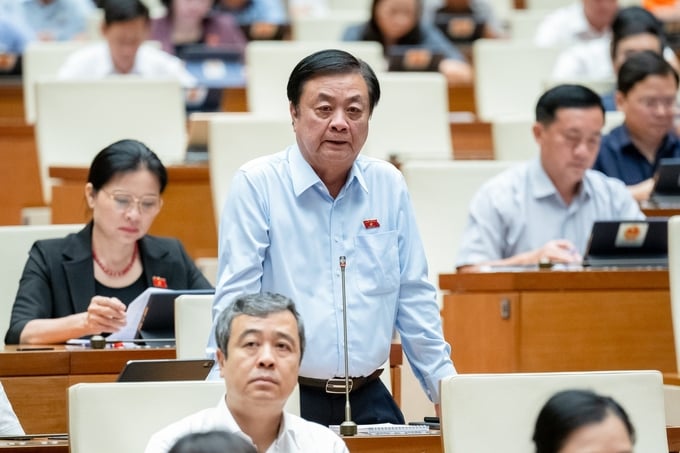November 26, 2025 | 18:27 GMT +7
November 26, 2025 | 18:27 GMT +7
Hotline: 0913.378.918
November 26, 2025 | 18:27 GMT +7
Hotline: 0913.378.918

Minister Le Minh Hoan answered questions related to water security and reservoir safety at the National Assembly on the morning of June 4. Photo: National Assembly.
In response to the concerns voiced by delegates on water reservoirs, irrigation, and the issues of drought and saltwater intrusion in the Mekong Delta, Minister of Agriculture and Rural Development Le Minh Hoan acknowledged the challenges encountered by the local population in this region. The Minister further declared that the ongoing landslides are having a substantial impact on the livelihoods of the population.
As per the Minister's statement, the Prime Minister recently undertook an inspection visit and tasked the Ministry of Agriculture and Rural Development with presenting a detailed plan for this matter. The Ministry is anticipated to publish a comprehensive and strategic strategy addressing the concerns of drought and saltwater intrusion by September.
The Ministry additionally solicited input from specialists in Hanoi and Ho Chi Minh City. They also convened a symposium, presided over by the Prime Minister, which brought together leaders, professionals, and scientists from 13 provinces in the Mekong Delta to obtain further expert perspectives on this issue.
Minister Le Minh Hoan emphasized that the global assessment of water resources indicates that we are presently experiencing a worldwide period of low rainfall, which is not only affecting Vietnam but also other countries. Vietnam is particularly susceptible to the impacts of this dry era.
The Minister emphasized the need to take into account three key factors when dealing with water-related matters: the volume of water available, the level of water purity, and the manner in which we utilize water resources. More precisely, our utilization of water resources will have a direct influence on both the amount and the standard of water.
"Historically, we have never seen water as a valuable asset, nor perceived it as inexhaustible. Nevertheless, in light of the difficulties posed by climate change and our current methods of utilizing and managing water, it is imperative that we alter our approach to water resources.
It is imperative that we establish a 'declaration' with farmers across the nation to acknowledge that our country does not possess ample water resources”, the Minister stated.
Hence, Minister Le Minh Hoan emphasized the necessity of implementing short-term, medium-term, and long-term measures, along with comprehensive plans, to shift agriculture practices from flood irrigation to drip irrigation.
The Minister highlighted the interconnectedness between water conservation and greenhouse gas emissions. The initiative aims to cultivate high-quality rice on 1 million hectares of land, while simultaneously reducing emissions associated with green growth and improving water efficiency. This project will contribute to the overall reduction of emissions. The Minister is optimistic that the National Assembly will endorse the project that has been authorized by the Government.
Minister Le Minh Hoan has expressed that the Ministry of Agriculture and Rural Development will recommend to the Government that they give priority to investing in the Mekong Delta. Specifically, they will focus on projects that have extensive reach and provide benefits to a large number of people in order to address the pressing issue of saltwater intrusion and freshwater storage.
Minister Le Minh Hoan emphasized the necessity for careful consideration when it comes to reservoirs. Utilizing huge regions for water storage across different localities, especially in flat terrains without slopes, poses significant challenges.
The Minister proposed that municipalities should consult the expertise of Tra Vinh province in regards to accessing water sources, implementing water conservation measures, and mitigating the effects of saltwater intrusion.
In terms of irrigation reservoirs, under the principle of decentralization, the Ministry of Agriculture and Rural Development is directly responsible for overseeing 5 major reservoirs, while an additional 25 reservoirs are managed by various provinces, as part of the decentralization process. Thus far, the reservoirs remain secure, subject to continuous monitoring and effective management. The 900 big, medium, and small reservoirs have been devolved to municipalities for management. Investment resources are allocated according to the local budget law.
Nevertheless, in the case of municipalities with restricted resources, MARD also sent a report to the Prime Minister requesting more targeted solutions. The Minister proposed that National Assembly representatives strengthen oversight and recommend upkeep and repairs to protect the safety of reservoirs operated by local authorities...
In addition, Minister Le Minh Hoan proposed that municipalities should capitalize on the advantages offered by landscapes and tourism in reservoir areas, in order to broaden their sources of income and provide a wider range of economic opportunities for the local population.
Translated by Linh Linh

(VAN) The Disaster Prevention Community Fund has mobilized resources to install automatic rain gauge and flood warning stations, helping localities proactively respond to natural disasters more effectively.

(VAN) Thanh Hoa province has substantial potential to supply carbon credits, opening opportunities for green economic development, enhancing agriculture and forestry value.
/2025/11/25/1741-0-nongnghiep-221736.jpg)
(VAN) The application of AI helps identify emission sources and assess air pollution developments, thereby supporting management agencies in issuing timely and appropriate control policies.

(VAN) Viet Nam will develop its carbon market not only by prioritizing transaction volumes but also by transitioning to a low-emission economy.
/2025/11/25/3413-1-171953_261.jpg)
(VAN) Experts from the Vietnam Academy of Science and Technology have conducted surveys to identify the causes of landslides in Lam Dong province and propose natural disaster prevention solutions.

(VAN) The HNT reservoir operation support system, developed by WeatherPlus in collaboration with Kyushu Electric Power, enables real-time rainfall forecasting, inflow forecasting, and flood-release simulations.

(VAN) Dr. Cao Duc Phat stated that the localization of early natural disaster warning technologies will help meet practical requirements and create favorable conditions for domestic research institutions and businesses to develop.